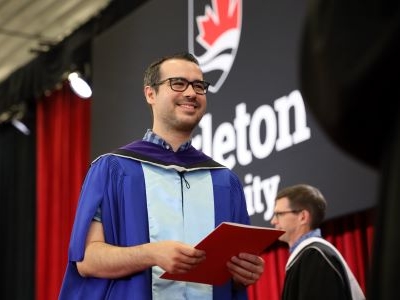Anthropology graduate student Justin Langille is addressing the chronic problem of youth homelessness by speaking directly to the young people who are living on Ottawa’s streets.
After five years of working with youth in Housing First initiatives across Canada, including Vancouver and London, Ont., the master’s student is well aware of the social and cultural factors that contribute to youth homelessness. In Ottawa alone, nearly 1,000 young people between the ages of 16 and 25 access an emergency shelter annually.
“Homelessness is a serious economic drain on the public purse,” says Langille. “The cost of emergency services to individuals who are homeless far outweighs the cost of providing them with affordable and appropriate housing. The cost to society of youth homelessness is even higher,” he adds, “as young people who are homeless or at risk of homelessness are much more likely to end up in the criminal justice system or to develop serious physical and mental health issues.”
With $15,000 in funding from Mitacs, a national non-profit research organization, and the Alliance to End Homelessness Ottawa (ATEHO), Langille is working under the supervision of principal investigator Jacqueline Kennelly, an associate professor in sociology whose work focuses on youth cultures and urban sociology. Over the next six months, they will explore best practices for moving Ottawa youth into permanent housing and what kind of support they need.
The project is part of a new national coalition, A Way Home. Six national organizations, including the Canadian Alliance to End Homelessness (CAEH), are supporting communities and governments to end the crisis, which affects nearly 40,000 young people across Canada each year. The program launched last fall in Ottawa.
“I’m interested in the health and well-being of people who are marginalized, as well as the frontline staff supporting them,” explains Langille, who once envisioned working in international development, and global poverty and disparity. As he learned about the inequalities in the communities around him, he felt driven to focus on local issues. “Now I want to contribute to addressing the homelessness problem in Canada and to build on that experience.
“The needs of homeless youth are significantly different than those of adults. Research shows youth are at a different point in the trajectory of their lives. They are profoundly affected by family instability and abuse, and are often marginalized due to their sexuality. And they are extremely vulnerable.”
Kennelly adds that street youth are subject to such risks as sexual attack, addiction, suicide, mental health deterioration and police violence. In Ottawa specifically, young people on the street face pressure on authorities to keep Canada’s capital clean and free of visible poverty, as well as the severe winters.
Through personal interviews and focus groups at drop-in spaces and shelters, Langille will attempt to understand how young people in Ottawa who are homeless or facing homelessness perceive what they need in order to succeed. For example, what do they have to say about strategies such as Housing First, which helps house people first before addressing problems of addiction, poverty or mental illness?
The Mitacs-funded research will also include talking to service providers in education, recreational facilities and other family services who encounter youth on the street.
“I am really excited about the impact this project could have,” says Langille. “To contribute to the end of a chronic social problem is a significant achievement.”
Kennelly, who is on the steering committee for A Way Home Ottawa in alignment with the national initiative, anticipates the project will help ensure the long-term success of A Way Home’s mandate to prevent and ultimately end youth homelessness.





